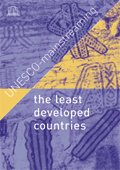|
UNESCO and Least Developed Countries |
|
 |
UNESCO- mainstreaming : the least developed countries Part of the "UNESCO-mainstreaming" series produced by BSP. Excerpt from the Director-General's introduction: The situation of the forty-nine least developed countries (LDCs) implicates over 630 million individuals and today calls for more resources and greater resolve as UNESCO fully integrates the special needs of LDCs into the mainstream of its programmes. The situation in some countries is particularly critical, compounded as it is by the devastation wrought by HIV/AIDS, internal conflicts and governance crises. Given their perilous, fragile situation, the LDCs will receive special attention from UNESCO. The Organization has already begun to orient its programmes towards attaining the Millennium Development Goals (MDGs) adopted at the United Nations Millennium Summit in New York in September 2000, in particular the goal of cutting extreme poverty in half by the year 2015. Resources, expertise and competence in education, the sciences, culture and communications will be focused into effective interventions and actions, and these will be carried out in close cooperation and coordination with the other partners of the United Nations system, with bilateral partners, civil society and the private sector, drawing on UNESCO’s recently restructured and reinforced network of field offices. The May 2001 Brussels Declaration and Programme of Action for LDCs provides the framework for all these efforts. In particular, we must
devise new educational arrangements and approaches to address the needs of
these countries, to promote education in science and technology, to spread
technical and vocational education and to use the new information and
communication technologies as invaluable tools for reaching out to the
educationally deprived. We now have the Dakar Framework for Action,
Education for All: Meeting our Collective Commitments, adopted at the
World Education Forum (Dakar, Senegal) in 2000. It should be the starting
point for all of our programmes in support of the least developed
countries. Follow this link to down-load a free copy of this booklet >>>
|
|
Recent Publications that are
for sale by UNESCO Publishing |
|
 |
BIOTECHNOLOGIES
IN DEVELOPING COUNTRIES: PRESENT AND FUTURE Volume 3 - Regional and subregional co-operation, and joint ventures By Albert Sasson 2001, ISBN 92-3-103792-7 Order this Book >>>
Since the 1980s, many developing countries have used the existing
institutional regional and subregional co-operation frameworks to foster
their collaboration in biotechnology research and development. This
endeavour helps them to avoid being marginalized within a globalized
economy and, complemented with economic, scientific and technological
co-operation, serves them as a springboard for the endogenous development
of biotechnologies. |
 |
COPYRIGHT
- ENGINE OF DEVELOPMENT An analysis of the role of copyright in economic development and cultural vitality By Ralph Oman 2000, ISBN 92-3-103738-2 Download this e-book >>>
This work, the first digital publication proposed by UNESCO Publishing,
highlights the economic benefits that flow to developing countries from
strong copyright protection. It documents the cultural benefits that
spring from the elimination of copyright piracy. Most important, though,
it attemps to give the reader the arguments needed to answer the hard
question posed at the outset, be they from a government minister, a
law-school student, or one's own children: why copyright? |
 |
FINANCING
SECONDARY EDUCATION IN DEVELOPING COUNTRIES In 1990, at the World Conference on Education for
All in Jomtien, and again in April 2000 in Dakar, most developing
countries reaffirmed their commitment to providing their school-age
children with universal access to a first cycle of education. The number
of children who graduate from primary education is expanding rapidly and
putting pressure on governments to open up educational opportunities at
higher levels. |
 |
L'HUMANITÉ
SUR LA PLANÈTE : POPULATION ET PERSPECTIVES DE DÉVELOPPEMENT DANS LE
MONDE ARABE |
 |
WHY
EAT GREEN CUCUMBER AT THE TIME OF DYING? Exploring the link between women's literacy and development: a Nepal perspective By Anna Robinson-Pant 2001, ISBN 92-820-1107-0 UNESCO Publishing / UIE Order this book >>>
This book challenges the assumption that women's literacy rates can be
measured and correlated with statistical indicators of development, such
as child mortality or fertility rates. Using rich ethnographic data from
two contrasting literacy programmes in Nepal, the author examines what
kind of literacy and what kind of development are being promoted by
international aid agencies. As well as bringing the voices of women
participants, class facilitators and trainers into the policy arena, the
book looks at how ethnographic research like this could be used to improve
current development planning practices. |